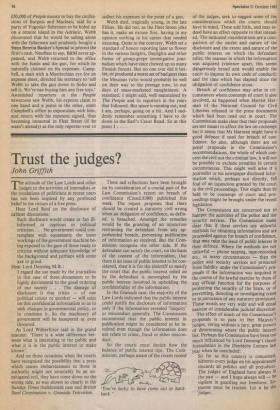Trust the judges?
John Griffith
The attitude of the Law Lords and other judges to the activities of journalists or the revelations of politicians in recent years has not been inspired by any profound belief in the virtues of a free press.
Hear Lord Reid on the disclosure of cabinet discussions: Such disclosure would create or fan illinformed or captious or political criticism . . . No government could contemplate with equanimity the inner workings of the government machine being exposed to the gaze of those ready to criticise without adequate knowledge of the background and perhaps with some axe to grind.
Hear Lord Denning M. R.: I regard the use made by the journalists in this case of these documents to be highly detrimental to the good ordering of our society . . The damage of disclosure is that critics — of one political colour or another — will seize on this confidential information so as to seek changes in governmental policy, or to condemn it. So the machinery of government will be hampered or even thwarted.
As Lord Wilberforce said in the grand manner: 'There is a wide difference between what is interesting to the public and what it is in the public interest to make known'.
And on those occasions when the courts have recognised the possibility that a press which causes embarrassment to those in authority might not invariably be an unmitigated evil, they have come down on the wrong side, as was shown so clearly in the Sunday Times thalidomide case and British Steel Corporation v. Granada Television. These sad reflections have been brought on by consideration of a crucial part of the Law Commission's report on breach of confidence (Cmnd.8388) published this week. The report proposes that there should be created a statutory civil wrong when an obligation of confidence, as defined, is breached. Amongst the remedies would be the granting of an injunction restraining the defendant from any apprehended breach, preventing publication of information so received. But the Commission recognise the other side. If the defendant can satisfy the court, on the basis of the content of the information, that there is an issue of public interest to be considered, then it is for the plaintiff to satisfy the court that the public interest relied on by the defendant is outweighed by the public interest involved in upholding the confidentiality of the information.
In the Granada case, the majority of the Law Lords indicated that the public interest could justify the disclosure of information only if the information revealed 'iniquity' or misconduct generally. The Commission recommend that the public interest in publication might be considered to be involved even though the information does not relate to crime, fraud or other misconduct.
So the courts must decide how the balance of public interest tips. The Commission, perhaps aware of the recent record of the judges, seek to suggest some of the considerations which the courts should have in mind. These add little, and may indeed have an effect opposite to that intended. The indicated considerations are a comparison of the extent and nature of the disclosure and the extent and nature of the public interest on which the defendant relies; the manner in which the information was acquired (violence apart, this seems dangerously broad and would enable the court to impose its own code of conduct); and the time which has elapsed since the obligation of confidence arose.
Breach of confidence may arise in circumstances where contempt of court is also involved, as happened when Harriet Harman of the National Council for Civil Liberties released to the press documents which had been read out in court. The Commission make clear that their proposals are not meant to affect the law on contempt but it seems that Ms Harman might have a good defence if sued for breach of confidence. So also, although there are no penal proposals in the Commission's recommendations, the whole of which concern the civil not the criminal law, it will not be possible to exclude penalties in certain circumstances. This might well arise if a journalist or his newspaper disclosed information which, perhaps not directly, fell foul of an injunction granted by the court in the civil proceedings. This might then be held to be contempt of court and proceedings might be brought under the recent legislation.
The Commission are concerned not to hamper the activities of the police and the security services. The Commission make clear that if these services use unlawful methods for obtaining information and are proceeded against for breach of confidence, that may raise the issue of public interest in their defence. Where the methods are not unlawful — phone tapping, tape-recording etc., in many circumstances — then the police and security services are protected from liability under the Commission's proposals if the information was acquired in the course of the lawful exercise by them of any official function for the purposes of protecting the security of the State, or of preventing, detecting or investigating crime or in pursuance of any statutory provisions. Those words are very wide and will entail exercise of considerable judicial discretion.
The effect of much of the Commission's proposals is to pass to Her Majesty's judges, sitting without a jury, great powers of determining where the public interest lies. Perhaps the Commission have been too much influenced by Lord Denning's classic formulation in the Dimbleby Lecture last year when he concluded: So far as this country is concerned, hitherto every judge on his appointment discards all politics and all prejudices. The judges of England have always In the past — and I hope always will — be vigilant in guarding our freedoms. Someone must be trusted. Let it be the judges.






































 Previous page
Previous page